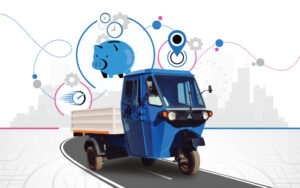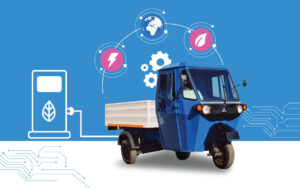Cost Comparison Between Electric Loaders and Traditional Loaders in India
As the demand for sustainable and efficient transport solutions grows, many businesses in India are weighing the costs and benefits of transitioning from traditional loaders to electric loaders. In this post, we’ll break down the cost comparison of electric loaders and traditional fuel-based loaders, covering upfront costs, maintenance, operational expenses and long-term savings. Understanding these factors can help businesses make an informed choice that aligns with their budget, environmental goals and operational requirements.
Initial Purchase Cost of Electric Loaders vs. Traditional Loaders
1. Upfront Cost Analysis
When considering electric loaders like electric three-wheeler loaders and electric cargo vehicles, it’s clear that these vehicles generally come with a higher initial purchase cost than traditional diesel or petrol loaders. The primary reason is the high cost of electric batteries, which are central to an electric loading vehicle’s design. However, government incentives under the PM E-Drive scheme can help reduce these upfront costs.
Tip: Businesses looking to make an eco-friendly investment may find that the higher initial cost of commercial electric vehicles is offset by savings in the long run. Learn more about electric vehicle incentives here.
2. Subsidies and Incentives for Electric Loaders
The Indian government offers subsidies to reduce the cost of electric three-wheeler loaders and other electric three wheelers. These incentives are part of a broader plan to promote sustainable transportation and reduce air pollution in Indian cities. With government support, the overall initial cost of electric loaders becomes more competitive, making it a viable option for small to medium-sized businesses.
Fuel and Operational Cost Comparison
1. Fuel Cost of Traditional Loaders
Traditional loaders rely on diesel or petrol, which come with fluctuating fuel costs. Rising fuel prices can increase the operational expenses of a traditional loader, affecting profitability. Additionally, fuel-based loaders contribute to air pollution and carbon emissions, which has led some businesses to seek cleaner alternatives.
2. Electricity Cost for Electric Loaders
In contrast, electric loaders rely on electricity, which is significantly cheaper than diesel or petrol. Charging an electric loader is considerably less expensive per kilometer traveled, which reduces overall operational expenses. For instance, the cost per kilometer for electric loaders is estimated to be around 1.5–2.5 INR, compared to 5–6 INR for traditional loaders.
Note: Businesses with high transportation needs can save substantially by switching to electric loaders due to lower fuel expenses. Read about the environmental impact of commercial EVs here.
Maintenance and Repair Costs
1. Maintenance of Traditional Loaders
Traditional loaders, especially diesel-powered ones, require regular maintenance, such as oil changes, engine checks, and exhaust system repairs. These expenses accumulate over time, leading to high maintenance costs that impact the total cost of ownership.
2. Lower Maintenance Needs of Electric Loaders
Electric loaders have fewer moving parts which helps to drastically reduce the likelihood of mechanical breakdowns. The batteries and electric motors used in electric cargo vehicles are designed for durability, often resulting in lower maintenance costs than fuel-based loaders. Studies have shown that electric vehicles can reduce maintenance expenses by 20-30%, making them a cost-effective option in the long run. Check for some maintenance tips for electric three wheeled vehicles.
Insight: By choosing commercial electric vehicles, companies can reduce downtime and maintenance costs, keeping their operations efficient and cost-effective.
Operational Efficiency and Performance
1. Load Capacity and Performance of Traditional Loaders
Traditional loaders are known for their strong performance and high load capacity, which makes them suitable for heavy-duty tasks. However, fuel efficiency may decrease with larger loads, increasing operational costs.
2. Efficiency of Electric Loaders
Modern electric three-wheeler loaders and electric cargo vehicles are optimized for urban and last-mile delivery needs. They offer efficient, zero-emission transport solutions that suit a wide range of commercial uses. However, electric cargo vehicles like Astro Motors’ Naya come with a loading capacity of 747 kgs, which is highest in the EV 3 wheeler segment. Additionally, the quick acceleration of electric loaders makes them ideal for short trips and frequent stops in city environments.
Pro Tip: Businesses that primarily operate within urban areas can benefit from the maneuverability and lower running costs of electric loaders.
Environmental and Economic Impact
1. Environmental Benefits of Electric Loaders
Electric loaders produce zero tailpipe emissions, reducing air pollution and greenhouse gas emissions. This shift aligns with India’s sustainability goals and the growing preference for green solutions in the logistics and transport sectors. By choosing electric cargo vehicles, businesses can contribute to cleaner air and demonstrate their commitment to corporate social responsibility.
2. Long-term Cost Savings and ROI
While the initial cost of an electric loader may be higher, the reduced fuel and maintenance expenses lead to a faster return on investment (ROI). Many companies report long-term cost savings by transitioning to commercial electric vehicles due to their lower operational expenses and government support.
Battery Life and Replacement Cost for Electric Loaders
1. Battery Life and Replacement Needs
The battery is a critical component of any electric loading vehicle. Although modern lithium-ion batteries have longer lifespans and better durability, they will eventually require replacement after 4–5 years. Battery replacement costs can be high; however, the ongoing improvements in battery technology are expected to reduce these costs in the near future. However with Astro Motors proprietary tech of the manual gear box the battery life is expected to stretch even further ensuring higher returns for the owner.
2. Impact on Total Cost of Ownership
Despite the high cost of battery replacement, the total cost of ownership for electric loaders often remains competitive with traditional loaders. Businesses are encouraged to evaluate battery warranties and consider the anticipated cost savings from reduced fuel and maintenance expenses.
Conclusion
In the cost comparison between electric loaders and traditional loaders, electric loaders offer clear advantages in terms of fuel and maintenance savings, environmental impact, and long-term ROI. Although the initial purchase price is higher, the benefits of reduced operational costs, government incentives, and alignment with sustainability goals make electric loading vehicles an attractive option for businesses in India. By considering their specific operational needs and budget, businesses can determine whether electric cargo vehicles are the right fit for their logistics requirements.




